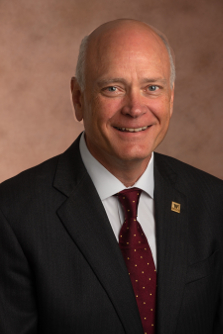
In leading the Rapid Response Team at WMed that was put in place in March because of the COVID-19 pandemic, Dr. Hal B. Jenson said the daily developments and rapid changes that have occurred since the team’s formation have underscored the importance – more than ever – of each of us being lifelong learners.
“We prepare people for the future by insuring they can adapt and learn, because we know that circumstances are going to change,” Dr. Jenson said. “The purpose of being a lifelong learner, and also as a learning organization, is to be equipped to respond in an effective way to meet the needs of the moment.”
Dr. Jenson said the commitment to lifelong learning for leaders, faculty, residents, students, and staff at the medical school has been extremely beneficial as the WMed community has had to quickly adapt to numerous changes because of the coronavirus.
Those changes have ranged from a quick transition to virtual learning and virtual patient visits at WMed Health to virtual meetings and working from home, among many others. The impact on daily life for the WMed community has been immense, Dr. Jenson said, but the commitment to lifelong learning has prepared us with an ability for each group to be agile in the face of the pandemic.
“This pandemic has changed how we have to do things but it hasn’t stopped us from getting the things done that we need to,” he said.
In addition to being agile, Dr. Jenson said resilience and a tolerance for ambiguity will help faculty, residents, students, and staff, as well as the community, push through this unprecedented time. At WMed, Dr. Jenson said the curriculum for students and residents, as well as professional development for faculty and staff, go beyond just knowledge and technical skills to equip learners and employees with the emotional intelligence that leads to the development of resilience and ambiguity tolerance.
“Resilience and tolerance for ambiguity are key attributes that that get us through something like this,” Dr. Jenson said. “There is a lot of stress, and a lot of uncertainty.”
In the face of the uncertainty brought on by the COVID-19 pandemic, Dr. Jenson said he has been gratified by the work of other leaders at WMed who have worked alongside him and have taken initiative to solve problems and push the medical school forward.
“Individuals and leaders accepting responsibility and taking initiative is a sign of a mature organization. It has been reassuring given all that has happened to see how agile we have been to meet the needs of education, research, clinical care, and planning,” Dr. Jenson said.
As work continues at WMed, Dr. Jenson said he and other leaders and members of the Rapid Response Team are working toward a plan for what a phased return will look like for all members of the WMed community. Physicians – both faculty and residents – at WMed Health have continued to see patients as the pandemic has unfolded, but students and a majority of nonclinical staff have been learning and working remotely since March.
Dr. Jenson said the phased return, when it does occur, will be driven by federal and state requirements, CDC guidelines, and the most up-to-date information about the coronavirus to ensure the health and safety of our patients as well as faculty, residents/fellows, students, and staff.
In the meantime, Dr. Jenson said he recognizes that the pandemic has led to trying times for the WMed community and the Kalamazoo community. With that in mind, he said he encourages everyone to intentionally take time to focus on their own mental health, and have a keen awareness of the impact the pandemic is having on our families and friends.
“The stay-at-home order and the disruption to our lives creates a lot of individual stress,” Dr. Jenson said. “This has a huge mental health impact on each of us. We’re all ‘alone together,’ and we have to be aware and sensitive to what’s happening to our family members and friends because the toll can be significant even on those who seem very strong.”
